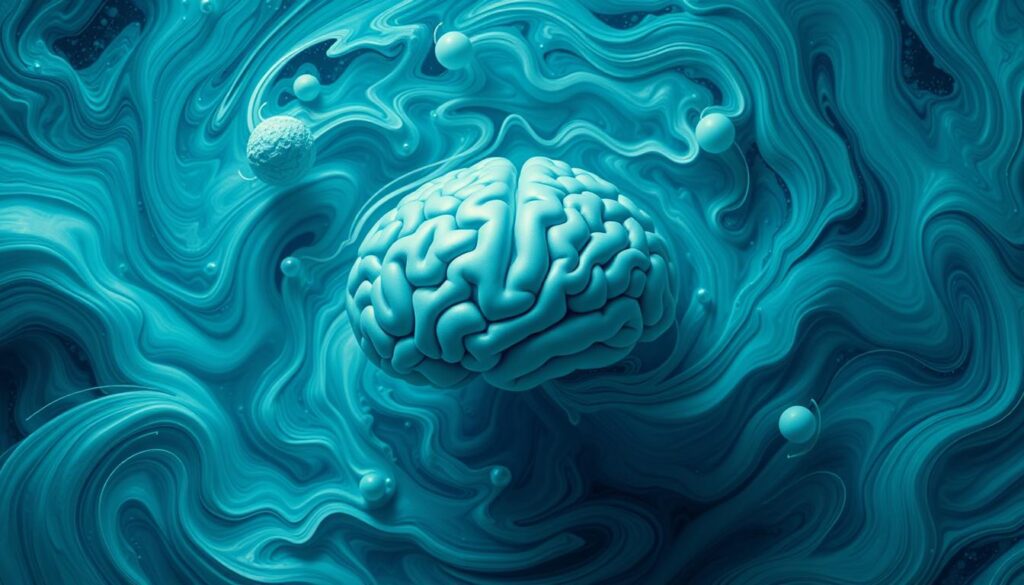About 30-45% of people with liver cirrhosis get hepatic encephalopathy. This serious condition badly affects brain function and daily life. It happens when the liver can’t remove toxins from the blood. This leads to harmful substances building up, harming brain function and overall health.
It’s important to know the symptoms, causes, and treatments for hepatic encephalopathy if you have chronic liver disease. Spotting early signs and getting medical help quickly can help lessen the condition’s effects. This can greatly improve your life quality.

Key Takeaways
- Hepatic encephalopathy is a serious complication of liver disease that affects brain function
- It is caused by the buildup of toxins in the bloodstream due to the liver’s inability to properly filter them out
- Symptoms can range from mild cognitive impairment to severe confusion, disorientation, and coma
- Early detection and proper management are crucial to mitigate the impact on daily life and quality of living
- Treatment options focus on reducing toxin levels, addressing the underlying liver condition, and supporting brain function
Understanding Hepatic Encephalopathy: An Overview
Hepatic encephalopathy is a brain disorder caused by liver problems. It shows how the liver and brain work together. When the liver can’t remove toxins, these toxins harm the brain, causing symptoms.
The Relationship Between Liver Disease and Brain Function
The liver is key in breaking down and removing substances from the body. In people with liver disease, like cirrhosis complications, the liver can’t do this well. This leads to toxins, like ammonia, building up in the blood and affecting the brain.
Impact on Daily Life and Quality of Living
Hepatic encephalopathy can really change someone’s life. It causes problems with thinking, memory, and focus. This makes everyday tasks hard and can take away independence.
In severe cases, physical symptoms like tremors, muscle weakness, and sleep issues get worse. These symptoms can make life even harder.
“Living with hepatic encephalopathy can be a daunting experience, as the cognitive and physical symptoms can make even the most mundane activities a struggle.”
Early Warning Signs and Symptoms
It’s key to spot the early signs of cognitive impairment and neurological disorder linked to hepatic encephalopathy. This condition can sneak up on you, showing up in small changes in how you think, feel, and act.
One big sign is when your mind doesn’t work as well as it used to. You might find it hard to focus, forget things, or solve problems. These issues can make everyday tasks tough and affect your ability to make decisions.
- Changes in your mood, like getting easily upset or confused, are also signs.
- Physical signs, like shaking, speaking unclearly, or sleeping too much or too little, can show up too.
These symptoms can start off small and grow slowly. They might seem like other health issues at first. But knowing the signs early and getting checked out by a doctor can help a lot. It can lead to catching and treating cognitive impairment and neurological disorder linked to hepatic encephalopathy sooner.
| Early Warning Signs | Cognitive Impairments | Physical Symptoms |
|---|---|---|
| Difficulty concentrating | Memory lapses | Tremors |
| Personality changes | Decreased problem-solving abilities | Slurred speech |
| Mood swings | Confusion | Sleep pattern changes |
By keeping an eye out for these signs, you and your doctor can act fast. This can help tackle the liver disease and lessen the effects of cognitive impairment and neurological disorder from hepatic encephalopathy.

The Connection Between Liver Disease and Cognitive Decline
Liver disease can severely impact our thinking and memory. This is because of a buildup of ammonia in the blood. When the liver can’t break down ammonia, it harms the brain, causing many problems.
How Ammonia Affects Brain Function
High levels of ammonia can make the brain swell. This swelling messes with how the brain works. It can cause memory loss, confusion, and trouble with coordination.
Stages of Mental Deterioration
- Early stage: Small changes in thinking, like trouble focusing and mild confusion.
- Intermediate stage: More obvious problems, like getting lost, mood changes, and speech issues.
- Late stage: Severe confusion, coma, and life-threatening issues.
Physical Manifestations
Ammonia toxicity also shows up in physical ways. People might shake, feel weak, or have trouble sleeping. As it gets worse, doing everyday things becomes harder, affecting their life and freedom.
It’s important to know how liver disease affects the brain. By treating ammonia buildup and its symptoms, doctors can help patients keep their thinking sharp. This improves their life quality and independence.
Risk Factors and Common Triggers
Hepatic encephalopathy is a serious problem linked to liver disease. Knowing what causes it is key to managing it well.
Cirrhosis, a chronic liver disease, is a major risk factor. It causes scarring and hampers liver function. This leads to toxins building up in the blood, affecting the brain.
- Infections, like bacterial infections or spontaneous bacterial peritonitis, can also trigger hepatic encephalopathy.
- Electrolyte imbalances, especially low sodium or potassium, can harm brain function and lead to encephalopathy.
- Certain medications, like sedatives or diuretics, may also trigger or worsen the condition.
- Dehydration, upper gastrointestinal bleeding, and constipation can also be triggers for hepatic encephalopathy in individuals with liver disease.
It’s vital to recognize and manage these risk factors and triggers. This is crucial for preventing and treating hepatic encephalopathy in those with liver disease or cirrhosis complications.
| Risk Factor | Description |
|---|---|
| Cirrhosis | A chronic liver disease characterized by scarring and impaired liver function, leading to the accumulation of toxins in the bloodstream. |
| Infections | Bacterial infections or spontaneous bacterial peritonitis that can precipitate episodes of hepatic encephalopathy. |
| Electrolyte Imbalances | Particularly low levels of sodium or potassium, which can disrupt brain function and contribute to the development of encephalopathy. |
| Medications | Certain sedatives or diuretics may trigger or exacerbate the condition. |
| Other Factors | Dehydration, upper gastrointestinal bleeding, and constipation can also be triggers for hepatic encephalopathy. |
By identifying and addressing these risk factors and triggers, healthcare providers can develop targeted strategies to prevent and manage hepatic encephalopathy in individuals with liver disease.
Diagnostic Methods and Testing Procedures
Doctors use blood tests, neurological exams, and brain scans to diagnose hepatic encephalopathy. These steps help find the cause and how severe the brain issue is.
Blood Ammonia Levels Testing
Measuring blood ammonia levels is key. High levels show ammonia toxicity, a sign of hepatic encephalopathy. This test shows how well the liver is working and how bad the problem is.
Neurological Examinations
Doctors also do a detailed neurological exam. They check the brain’s functions, like thinking and movement. This helps them see how much the brain is affected by the condition.
Brain Imaging Techniques
CT scans and MRI are used too. They look for brain changes linked to the condition. This info helps doctors plan the best treatment.
| Diagnostic Procedure | Purpose | Key Findings |
|---|---|---|
| Blood Ammonia Levels Testing | Measure ammonia concentration in the bloodstream | Elevated ammonia levels indicate ammonia toxicity and liver dysfunction |
| Neurological Examination | Assess cognitive abilities, reflexes, and neurological functions | Identify any neurological impairments or neurological disorders |
| Brain Imaging (CT, MRI) | Detect structural changes or abnormalities in the brain | Provide insights into the extent of the neurological disorder |
These tests help doctors find and understand hepatic encephalopathy. They can then create a treatment plan and track the patient’s progress.

Medical Treatment Options and Approaches
Doctors use many treatments for hepatic encephalopathy. They aim to treat the liver disease and reduce symptoms. The main goal is to stop the condition from getting worse and leading to hepatic coma.
Lactulose is a key medicine for this condition. It’s a synthetic sugar that helps remove ammonia from the gut. This reduces the toxic substances that harm the brain and nervous system.
- Lactulose treatment: It’s often the first choice because it improves mental function and lowers the risk of hepatic coma.
- Antibiotic therapy: Doctors might use antibiotics to fight bacteria in the gut. This helps reduce ammonia levels in the body.
- Dietary modifications: Changing the diet, like eating less protein, helps manage toxins. This supports recovery.
| Treatment Approach | Mechanism of Action | Potential Benefits |
|---|---|---|
| Lactulose | Reduces ammonia absorption from the gut | Improves mental status, reduces risk of hepatic coma |
| Antibiotics | Targets gut bacteria that produce ammonia | Helps lower overall ammonia levels |
| Dietary Modifications | Limits protein intake to manage ammonia production | Supports the body’s recovery and reduces toxin buildup |
In severe cases, doctors might consider liver transplant or mechanical liver support. These options aim to treat the liver disease and reverse brain and nervous system problems.
Doctors use a mix of medicines, diet changes, and sometimes surgery to manage hepatic encephalopathy. This approach helps patients live better lives.
Lifestyle Modifications and Dietary Changes
Managing hepatic encephalopathy, a condition linked to liver disease, often requires a comprehensive approach. This includes both medical treatment and lifestyle adjustments. One key element is managing dietary protein intake carefully.
Protein Management Guidelines
For those with liver disease, finding the right balance in protein is crucial. It’s important to get enough protein to keep muscles strong and overall health good. But, it’s also important to not eat too much protein, as the liver can’t handle it well.
- Consult with a healthcare professional to determine the optimal daily protein intake, which may range from 0.5 to 1.2 grams of protein per kilogram of body weight.
- Focus on high-quality, easily digestible protein sources, such as eggs, fish, and certain dairy products, while limiting red meat and high-protein plant-based foods.
- Space out protein intake throughout the day, rather than consuming large amounts at once, to aid in the liver’s processing capabilities.
Nutritional Supplementation
Healthcare providers may also recommend specific nutritional supplements. These can help support liver function and overall health. Some examples include:
- Branched-chain amino acids (BCAAs) – These amino acids can help maintain muscle mass and reduce the risk of protein deficiency.
- L-ornithine L-aspartate (LOLA) – This compound can help decrease blood ammonia levels, a key factor in the development of hepatic encephalopathy.
- Probiotics – These beneficial gut bacteria may help reduce the production and absorption of ammonia, contributing to improved brain function.
By making these lifestyle changes and dietary adjustments, individuals with liver disease can manage their condition better. This can improve their overall quality of life.
“Proper management of protein intake and the strategic use of nutritional supplements can be instrumental in supporting the health and well-being of individuals living with liver disease.”
Prevention Strategies and Management Tips
Living with cirrhosis complications and cognitive impairment is tough. But, with the right steps, you can manage your health better. Here are some practical tips to help you:
- Stick to Your Medication: Taking your meds like lactulose or rifaximin is key for hepatic encephalopathy. Skipping doses can make symptoms worse.
- Watch What You Eat: Eating less protein and more calories and nutrients helps. It reduces ammonia in your body. Talk to a healthcare provider or nutritionist for a meal plan that works for you.
- Stay Active: Regular exercise boosts blood flow and brain health. Talk to your doctor to find the right exercise for you.
- Drink Less Alcohol: Cutting down or avoiding alcohol is crucial. It helps prevent liver damage and encephalopathy symptoms.
- Go to Regular Check-ups: Regular doctor visits are important. They help catch and manage problems early. This includes blood tests, brain checks, and scans.
By following these tips, you can manage your cirrhosis complications and cognitive impairment better. This can greatly improve your health and life quality.
“Effective management of hepatic encephalopathy requires a multifaceted approach, addressing both medical and lifestyle factors.”
Long-term Prognosis and Quality of Life
People with hepatic encephalopathy, a neurological disorder from liver disease, face different futures. The condition can be managed with treatment and lifestyle changes. But, the outcome depends on the liver disease and how well the person responds to treatment.
Monitoring and Follow-up Care
Managing hepatic encephalopathy well means regular check-ups. Patients might need blood tests, brain scans, and neurological exams. It’s key to talk often with doctors to adjust treatments and handle any issues.
Support Systems and Resources
Dealing with hepatic encephalopathy is tough for both the person and their caregivers. But, there are many resources to help. Support groups offer a community, emotional support, and advice. Educational materials from health organizations help patients and families understand and manage the condition.
| Support Resource | Description |
|---|---|
| American Liver Foundation | Offers educational resources, support services, and a national helpline for individuals with liver disease and their families. |
| Hepatic Encephalopathy Support Group | Provides a platform for patients and caregivers to connect, share experiences, and receive peer-to-peer support. |
| National Institutes of Health (NIH) | Provides comprehensive information on hepatic encephalopathy, including causes, symptoms, and treatment options. |
By staying active in monitoring, seeking support, and using reliable resources, people with hepatic encephalopathy can improve their future. They can also enhance their quality of life.
Conclusion
Hepatic encephalopathy is a complex condition that needs a deep understanding and effective management. This article has shown how liver disease affects the brain. It’s important to catch it early and treat it right to improve life quality.
Knowing the early signs and understanding the causes is key. Using the right tests is also crucial. The medical world is working hard to find better treatments. Lifestyle changes and diet also play a big role.
As research goes on, the outlook for those with hepatic encephalopathy will get better. We need to spread the word, act early, and work together. This way, we can lessen the impact of this condition and improve life for those affected.
FAQ
What is hepatic encephalopathy?
Hepatic encephalopathy is a serious brain disorder linked to liver disease. It causes problems with thinking, changes in mood, and physical symptoms. These issues arise because toxins build up in the brain due to liver failure.
What are the main causes of hepatic encephalopathy?
Chronic liver disease, like cirrhosis, is the main cause. It leads to a buildup of ammonia and toxins in the blood. These toxins can harm the brain by crossing the blood-brain barrier.
What are the early warning signs and symptoms of hepatic encephalopathy?
Early signs include slight changes in thinking and mood, sleep issues, and mild physical symptoms like tremors. These can be the first signs of the condition.
How does ammonia affect brain function in hepatic encephalopathy?
The liver can’t break down ammonia well in hepatic encephalopathy. This leads to high levels of ammonia in the blood. Ammonia toxicity then harms brain function, causing thinking problems and swelling in the brain.
What are the common triggers for hepatic encephalopathy episodes?
Triggers include infections, imbalances in electrolytes, bleeding in the gut, certain medicines, and high-protein diets. These can set off episodes of hepatic encephalopathy.
How is hepatic encephalopathy diagnosed?
Doctors use blood tests for ammonia levels, neurological exams, and brain scans like CT or MRI. These help find out how much the brain is affected.
What are the main treatment approaches for hepatic encephalopathy?
Treatment mainly involves medicines like lactulose to lower ammonia levels. Antibiotics and other treatments help manage symptoms and prevent worsening to a coma.
How can dietary changes and lifestyle modifications help manage hepatic encephalopathy?
Eating less protein and taking nutritional supplements are key. Regular exercise and managing stress also help support liver health and overall well-being.
What is the long-term prognosis for individuals with hepatic encephalopathy?
The outlook depends on the liver disease, how severe the condition is, and treatment success. Regular care, monitoring, and support systems can improve life quality and health outcomes.
